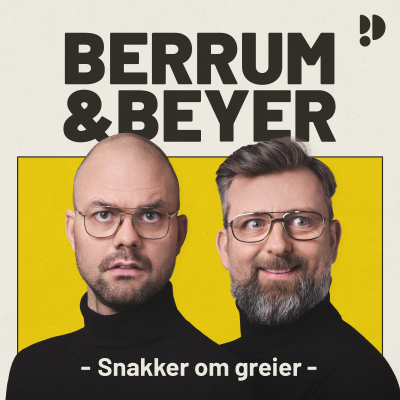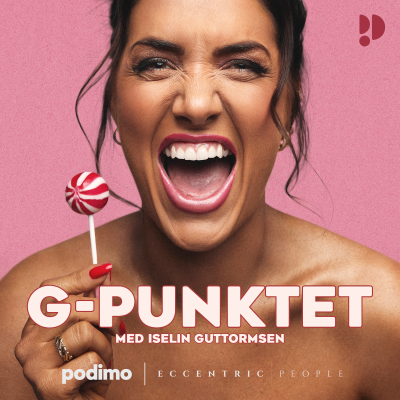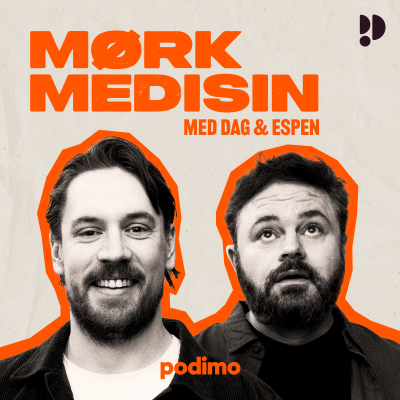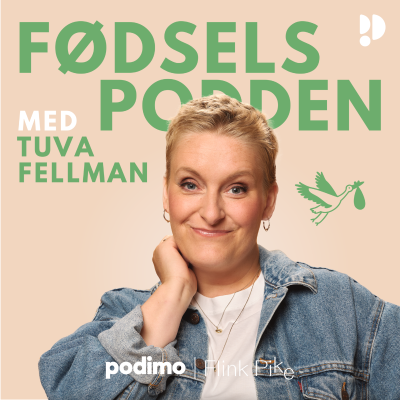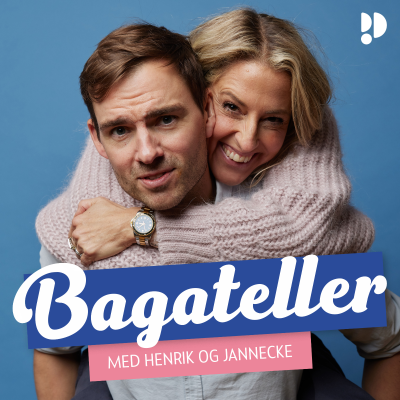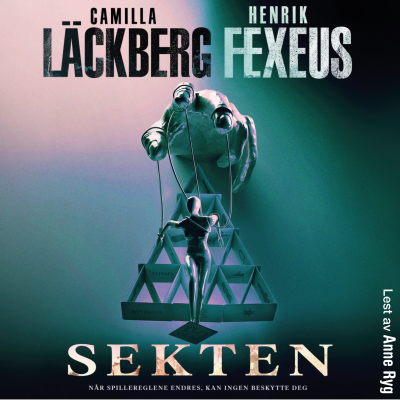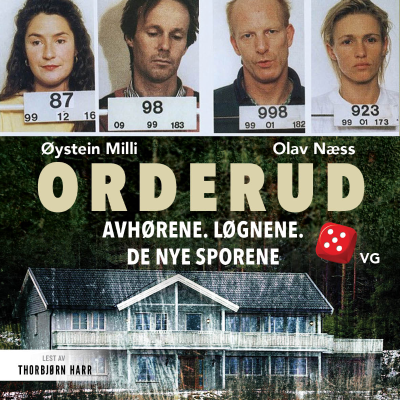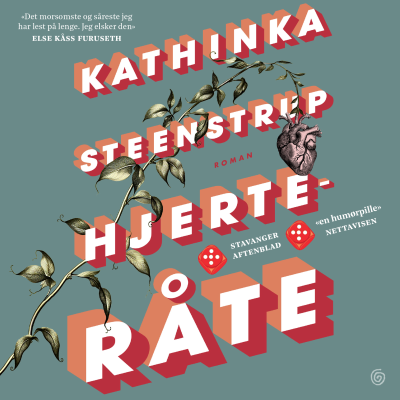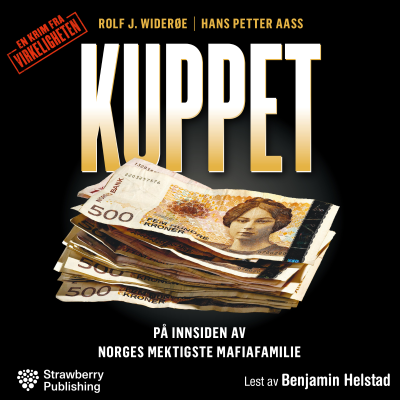
Risk Parity Radio
Podkast av Frank Vasquez
Tidsbegrenset tilbud
1 Måned for 9 kr
Deretter 99 kr / MånedAvslutt når som helst.

Mer enn 1 million lyttere
Du vil elske Podimo, og du er ikke alene
Vurdert til 4,7 stjerner i App Store
Les mer Risk Parity Radio
Risk Parity Radio is a podcast about investing located at www.riskparityradio.com. RPR explores risk-parity style portfolios comprised of uncorrelated or negatively correlated asset classes -- stocks, selected bonds, gold, managed futures, and other easily accessible fund options for the DIY investor. The goal is to construct portfolios that are robust and can be drawn down on in perpetuity, and to maximize projected Safe Withdrawal Rates regardless of projected overall returns.
Alle episoder
459 EpisoderIn this episode we answer emails from Niek, Dustin, Dale, Hydromod and . We discuss adopting a golden ratio mix and not having unrealistic expectations, the plusses and minuses of the AI-version-of-you fad, the new website and why trying to use gold futures for leverage might not be the best choice for your gambling problem. Link: Father McKenna Center Donation Page: Donate - Father McKenna Center [https://fathermckennacenter.org/how-you-can-help/donate/] Breathless Unedited AI-Bot Summary: Ever had a month where nearly everything in your portfolio rose and wondered if the universe broke? We unpack why September’s across-the-board lift made sense in a weaker-dollar world, what temporary positive correlation looks like in practice, and how a golden ratio-style allocation helps you ride the wave without refreshing your account every hour. A listener’s note from the road kicks off a candid conversation about trusting diversified portfolios and ignoring daily noise. From there, we dig into the hype and hazards of AI finance gurus—yes, including Ray Dalio’s “digital Ray.” We talk usefulness, accuracy gaps, and the risk of forming unhealthy attachments to bots that sound wise but miss nuance. Along the way, we challenge a popular myth: that copying successful people’s habits will unlock their results. Extraordinary investors aren’t great because they make their beds; they’re great because they’re extraordinarily skilled. For the rest of us, evidence-based allocations, low costs, and sensible rebalancing are the habits that pay. We also get practical. You’ll hear our simple distribution shortcut (divide by 240 for a 5% annualized monthly draw), plus a tour of our streamlined website with faster search and full transcripts. Then we roll up our sleeves on gold exposure: why futures create rollover and curve headaches, when ETFs and return-stacked funds can be smarter, and how modest, low-cost margin—or leveraging equities instead—can open room for diversifiers like gold and managed futures. The throughline is clarity over complexity: build a portfolio that bends without breaking, whether the dollar dips, inflation flares, or correlations get weird for a while. If this resonates, follow the show, leave a quick review, and share it with a friend who’s wrestling with allocation choices. Your questions shape future episodes—send them our way and join the conversation. Support the show [https://www.riskparityradio.com/support]
In this episode we answer emails from Jimmy, Anonymous and Matthew. We discuss financing a home with portfolio leverage via ETFs or margin, revel in the generosity of our listeners and real-life encounters, and review a risk parity style portfolio and plan. And touch on our recent vacation to South Africa. And THEN we our go through our weekly portfolio reviews of the eight sample portfolios you can find at Portfolios | Risk Parity Radio [https://www.riskparityradio.com/portfolios]. Additional Links: Father McKenna Center Donation Page: Donate - Father McKenna Center [https://fathermckennacenter.org/how-you-can-help/donate/] New Father McKenna Center YouTube Channel: Father McKenna Center - YouTube [https://www.youtube.com/@FatherMcKennaCenter] SOAR Gala Information: 2025 Washington DC Awards Gala - SOAR! - Support Our Aging Religious [https://soar-usa.org/event/2025-washington-dc-awards-gala/] Breathless Unedited AI-Bot Summary: A near-miss with lions on safari sets the stage for a different kind of risk: how to fund a new home when most of your wealth sits in a taxable portfolio. We dive straight into the trade-offs between selling positions, taking a margin loan at a low-cost broker, or using a return-stacked ETF like RSST to maintain exposure while freeing up cash. The core question isn’t just, “Can I do this?” but “Can I live with it through a full market cycle?” We break down taxes, financing costs, and the behavior premium that separates clever from fragile. From there, we build a clean, high-conviction risk parity allocation anchored in three pillars—stocks, Treasuries, and gold—and show why that can be enough to lift a safe withdrawal rate if you respect correlation math and rebalance discipline. Within equities, we pair large-cap growth with small value and international value to spread factor and regional risk. In the bond sleeve, we weigh a simple one-fund approach against a two-fund split (VGIT + VGLT) for small fee and flexibility gains. We also get practical on withdrawals: monthly trims from winners can quietly rebalance your portfolio while matching real-life bills, while quarterly or annual withdrawals suit planners who prefer fewer moves and more cash on hand. Finally, we pull up the dashboard. Gold’s massive run challenges narratives that cherry-pick 1980 as a starting point; bonds have life; small value lags; and our sample portfolios highlight why diversification and costs matter more than headlines. The classics keep compounding, while the leveraged set underscores that concentration plus leverage is a rough mix, and thoughtful “return stacking” needs clear rules and flexible spending. If you’re weighing a home purchase, chasing a higher safe withdrawal rate, or simply trying to keep your strategy steady, you’ll find concrete steps you can use today. Enjoy the conversation? Follow the show, leave a quick review, and share this episode with a friend who’s planning a big financial move. Support the show [https://www.riskparityradio.com/support]
In this episode we answer questions from Chris, George and "I Have No Name." We discuss a transition situation with bonus portfolio question, the plusses and minuses of Pralana and similar calculators, and an amusing take on the Golden Butterfly portfolio reimagined. Links: Father McKenna Center Donation Page: Donate - Father McKenna Center [https://fathermckennacenter.org/how-you-can-help/donate/] Rational Reminder Podcast: David C. Brown: The Underperformance of Target Date Funds | Rational Reminder 374 [https://www.youtube.com/watch?v=9zrhadWG3M8&list=PLUqaBvLWRZg-xagj4UX48-VxqgUmnEb5P] Breathless Unedited AI-Bot Summary: What happens when you need to transition from a high-equity portfolio to a risk parity approach but face limited investment options in your 401(k)? How reliable are those fancy retirement calculators that promise to predict your financial future? And do those neatly organized "bucket strategies" actually improve portfolio performance, or are they just psychological comfort tools? Frank Vasquez tackles these pressing questions from listeners who are navigating the complexities of retirement planning and portfolio construction. Beginning with practical advice for a listener four years from financial independence, Frank explores how to handle the transition to a risk parity portfolio despite restrictive 401(k) investment options. Rather than fixating on finding the perfect funds immediately, he suggests focusing on getting the macro-allocations roughly right until more flexibility becomes available through an IRA rollover. The conversation shifts to a critical examination of retirement calculators like Pralana that rely on parameterized returns rather than historical data. Frank cuts through the marketing hype to reveal why these tools often function more like crystal balls than reliable forecasting instruments. "You're supposed to use base rates," he explains, "not make up things from a crystal ball that says things are going to be worse than they were before, better than they were before." This segment offers a masterclass in distinguishing between good forecasting methodologies and mathematically sophisticated but fundamentally flawed approaches. Perhaps most illuminating is Frank's analysis of bucket strategies in retirement planning. While organizing investments into conceptual buckets labeled for different time horizons may feel reassuring, these psychological tools don't fundamentally alter portfolio performance. "Looking at personal finance and separating what is finance from what is personal" becomes the key insight, helping listeners distinguish between strategies that actually improve financial outcomes versus those that simply make complicated concepts easier to visualize. Ready to see beyond the marketing gimmicks and focus on evidence-based approaches to retirement planning? Listen now, then like, subscribe, and leave a review to support the show while Frank takes a brief hiatus until mid-October. Support the show [https://www.riskparityradio.com/support]
In this episode we answer one big long email from Mr. Bill (actually Dr. Bill). We discuss a planning process grounded in good data science, forecasting techniques and decision theory, and how we incorporate the concepts described in Bill Bengen's new book, using Dr. Bill as our guinea pig. And THEN we our go through our weekly portfolio reviews of the eight sample portfolios you can find at Portfolios | Risk Parity Radio [https://www.riskparityradio.com/portfolios]. Additional Links: Father McKenna Center Donation Page: Donate - Father McKenna Center [https://fathermckennacenter.org/how-you-can-help/donate/] Risk Savvy Lecture: Risk Savvy: How to Make Good Decisions [https://www.youtube.com/watch?v=KnRWVmWQG24] Bill Bengen's New Book: Bill Bengen's New Book | A Richer Retirement: Supercharging the 4% Rule to Spend More and Enjoy More. [https://www.bengenfs.com/] Portfolio Charts Safe Withdrawal Rate Calculator: Withdrawal Rates – Portfolio Charts [https://portfoliocharts.com/charts/withdrawal-rates/] Breathless Unedited AI-Bot Summary: Retirement planning doesn't have to be rocket science. In this illuminating episode, we dive deep into the transition from accumulation to distribution phases of financial independence, offering a clear-eyed approach based on data science and practical wisdom. At the heart of effective retirement planning lies proper forecasting methodology. Most financial advisors miss this crucial foundation – they load forecasts with conservative assumptions rather than using base rates, creating unnecessarily fearful projections. We explore why understanding the difference between risk (what's calculable) and uncertainty (what isn't) transforms how you should approach planning for the decades ahead. The four levers that control your retirement success form our central framework: supplemental income, asset selection, flexible withdrawals, and fear/hoarding. Each lever offers unique opportunities to optimize your financial independence. Risk parity portfolios consistently demonstrate 1-2% higher safe withdrawal rates than traditional portfolios, while simply accounting for retirees' typical lower inflation experience (CPI minus 1-2%) can safely increase withdrawal rates by 0.5-1%. We tackle the psychological aspects of retirement planning too. Most retirees underspend significantly, pulling the "fear and hoarding" lever while ignoring the other three, ultimately sacrificing quality of life and relationships. Instead, we advocate for thoughtful legacy planning while alive – supporting family members, teaching financial literacy, and creating meaningful impact with your resources. Whether you're approaching retirement or already there, this episode offers practical wisdom to simplify your planning process. By focusing on tracking expenses meticulously in the early years and using simple rules of thumb for long-term forecasting, you'll create a retirement plan that maximizes both financial security and life satisfaction. Support the show [https://www.riskparityradio.com/support]
In this episode we answer emails from Adam, Private Cowboy, and Jose. We discuss managed futures (again with references!), Bill Bengen's latest book and how it integrates into our approach, and the pros and cons of a Vanguard Personal Advisor-created portfolio and the hypocritical quandaries it creates with the gods of Simplicity. Links: Demystifying Managed Futures: Demystifying Managed Futures [https://www.aqr.com/Insights/Research/Journal-Article/Demystifying-Managed-Futures] Bloomberg Presentation On Investments In Inflationary Environments: MH201-SteveHou-Bloomberg.pdf [https://markethuddle.com/wp-content/uploads/2022/12/MH201-SteveHou-Bloomberg.pdf] Dunn Capital Analysis: High-Vol-Trend-Following-Trend-Index-Edition-0825-DIGITAL.pdf [https://www.toptradersunplugged.com/wp-content/uploads/2025/09/High-Vol-Trend-Following-Trend-Index-Edition-0825-DIGITAL.pdf] Kardinal Financial Video: What is Alternative Investing? [https://www.youtube.com/watch?v=aRCilv3QtRQ&list=PLlmJgwoToDcPAplwueVTadSpVf27nglFa] Interview of Bill Bengen: Episode 195: The 4% Rule and Beyond: Retirement Strategies with Bill Bengen [https://www.youtube.com/watch?v=IIXvP0-itzQ&list=PL-FHO7jGOHe4X9N9dH0cMJ-E4q2ugh7fL&index=1] Weird Portfolio: Weird Portfolio – Portfolio Charts [https://portfoliocharts.com/portfolios/weird-portfolio/] Afford Anything Episode: #618: How to Retire at 50 While Supporting Aging Parents, with Frank Vasquez - Afford Anything [https://affordanything.com/618-how-to-retire-at-50-while-supporting-aging-parents-with-frank-vasquez/] Corey Hoffstein Interview: Show Us Your Portfolio: Corey Hoffstein [https://www.youtube.com/watch?v=rowDp6JiWWs] Breathless AI-Bot Summary: The perfect asset allocation isn't a formula—it's a framework built on uncorrelated assets that dance to different drummers during market storms. This episode dives deep into managed futures, one of the most powerful yet misunderstood portfolio diversifiers available to individual investors. Three listener questions explore how managed futures fit within retirement portfolios, particularly for those approaching their post-career years. Frank breaks down why managed futures have essentially zero correlation to stocks, bonds, and even gold, making them uniquely valuable during both inflationary crises (like 2022) and deflationary periods (like 2008). He references new research from Dunn Capital comparing various alternative strategies and explains how ETFs like DBMF have democratized access to institutional-quality diversification. Beyond managed futures, the episode synthesizes Bill Bengen's latest safe withdrawal rate research with Ray Dalio's "Holy Grail" principle of uncorrelated assets. While Bengen's new book doesn't explicitly analyze alternatives, Frank connects these complementary approaches to formulate practical guidelines: maintain 40-70% equity exposure divided between growth and value, use 15-30% treasury bonds for recession protection, allocate 10-25% to alternatives, and limit cash to under 10%. The discussion takes a critical look at cookie-cutter financial advice, particularly questioning whether paying 0.3% annually to a Vanguard advisor provides value when their recommendations often involve overlapping funds and questionable international bond allocations. Frank challenges the "worship of simplicity" that permeates financial discussions while exposing the irony that these same advisors often recommend complex multi-fund portfolios. What emerges is a call for "system two" thinking—the willingness to incorporate new information rather than clinging to outdated formulas out of consistency. Support the show [https://www.riskparityradio.com/support]

Mer enn 1 million lyttere
Du vil elske Podimo, og du er ikke alene
Vurdert til 4,7 stjerner i App Store
Tidsbegrenset tilbud
1 Måned for 9 kr
Deretter 99 kr / MånedAvslutt når som helst.
Eksklusive podkaster
Uten reklame
Gratis podkaster
Lydbøker
20 timer i måneden

